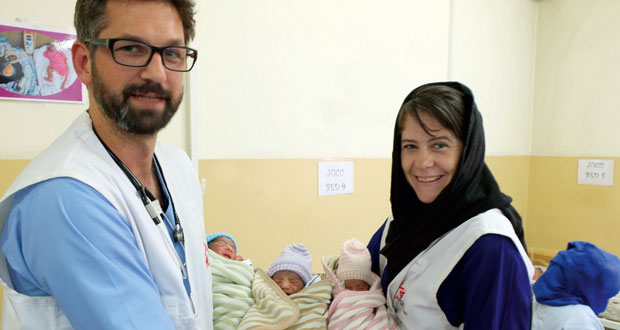A multiple birth brings excitement, anxiety and ultimately happiness to a pediatric hospital in Afghanistan.
By Ally Moebus
With nervous anticipation, I stood in Dasht-e-Barchi operating theatre. I’d spent most of my nursing career in Australia working at a tertiary pediatric hospital, but I had already been present at more births in Afghanistan than previously in my career. Six weeks earlier, I could never have imagined being part of the neonatal team waiting anxiously for the births of triplets. Yes, triplets!
Earlier in the evening, a woman expecting the babies arrived at the hospital. The woman, Gohdsieh, already had three kids under age 13. She was also the manager of a private girls’ school in Kunduz City, in the north of Afghanistan. She told us she was still ruling the place with her belly getting bigger, refusing to take holidays until the last minute.
When she found out she was having triplets, she decided to travel the five hours to Kabul to come to Médecins Sans Frontières’ Dasht-e-Barchi maternity hospital, as one of her relatives told her it provided good care.
When she arrived, her blood pressure was high and her urine showed high amounts of protein: all signs showed that she had pre-eclampsia [high blood pressure induced by pregnancy]. It was decided that it was in the mother and babies’ best interest to perform a caesarean section.
At the hospital, there was a real sense of excitement in the air. While there had been plenty of twins delivered in the facility, never before had there been triplets. The midwives were scrambling to find enough equipment to prepare for their arrival. Blankets, resuscitation equipment and enough drugs to deliver three babies were scoured for. Meanwhile, there was a flurry of movement in the neonatal unit, as beds were made available for three new residents.
In the operating theatre, the anesthetic team, led by Dr Ulrich, was preparing the patient, while Dr Sophie’s obstetric team was scrubbing. The neonatal team was trying to act all cool and collected, but I certainly was anything but. While I was preparing equipment and waiting for triplet number one (Triplet One would be my responsibility) my thoughts kept going through different scenarios. Would we have enough equipment in the neonatal unit if three more sick babies were admitted tonight? Where would we put three sick babies if we had to resuscitate them all at once (we have only one resuscitation table and no overhead heater)?
Before I knew it, Triplet One had arrived, a little boy, weighing 2.1kg and making a lot of noise. He clearly wasn’t overly impressed with his early delivery as I dried him off and showed him to his mother.
Triplet Two was another boy, weighing 1.8kg, making a little less noise on his entry into the world. After a little supplementary oxygen, it wasn’t long before he joined his brother in the neonatal unit.
Triplet Three was a gorgeous little girl, weighing slightly less than her brothers but with a fighting spirit (and possibly my favourite of the triplets).
A few days after their birth, their names were announced: Helal, Erbal, and Niguin for the lady. The rest of their family came to visit them in hospital. The three older kids were excited to meet their new brothers and sister: each of them picked one triplet to take care of.
Like all babies born too soon, they were at risk of hypothermia, infections and breathing and feeding difficulties. But after 10 days in the hospital, they were all healthy and ready to go home.
In Dasht-e-Barchi hospital, it is safe to say that sometimes good things come in threes.
Ally Moebus is a pediatric nurse from Melbourne. She recently spent time working in Médecins Sans Frontières’ Dasht-e-Barchi maternity hospital in Kabul, Afghanistan.
Do you have an idea for a story?Email [email protected]
 Aged Care Insite Australia's number one aged care news source
Aged Care Insite Australia's number one aged care news source

